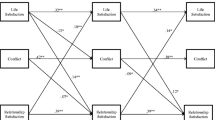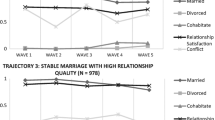Abstract
Poor relationship quality can increase an individual’s psychological distress. There is substantial debate regarding the influence of relationship quality for men and women. Some have found that women’s psychological distress is affected more by poor relationship quality compared to men. Others have found that psychological distress is equally affected for men and women, but it may look different—depressive symptoms for women and total alcohol consumption for men. In this study we examined how men and women differed in changes in relationship quality and changes in psychological distress. Then, we examined how changes in one manifestation of psychological distress and changes in relationship quality were related and how this association differed for men and women. Women reported lower initial relationship quality and total alcohol consumption but higher initial depressive symptoms. Men and women only differed on changes in total alcohol consumption, with women decreasing less than men over 25 years. Finally, both changes in total alcohol consumption and changes in depressive symptoms were related to changes in relationship quality for women, but not men. The reverse direction did not differ by gender, although change in depressive symptoms was related to change in relationship quality. Implications for future research are discussed.

Similar content being viewed by others
References
Allison, P. D. (2003). Missing data techniques for structural equation modeling. Journal of Abnormal Psychology, 112(4), 545–557. https://doi.org/10.1037/0021-843x.112.4.545.
Beach, S. R. H. (2001). Marital and family processes in depression: A scientific foundation for clinical practice. Washington, DC: American Psychological Association.
Beach, S. R. H., Sandeen, E. E., & O’Leary, K. D. (1990). Depression in marriage: A model for aetiology and treatment. New York, NY: The Guilford Press.
Beck, J. S. (2011). Cognitive behavior therapy: Basics and beyond. New York: Guilford Press.
Bruce, M. L., & Kim, K. M. (1992). Differences in the effects of divorce on major depression in men and women. The American Journal of Psychiatry, 149, 914–917. http://psycnet.apa.org/psycinfo/1992-43181-001.
Christian, J. L., O’Leary, K. D., & Vivian, D. (1994). Depressive symptomatology in maritally discordant women and men: The role of individual and relationship variables. Journal of Family Psychology, 8, 32–42. https://doi.org/10.1037/0893-3200.8.1.32.
Cranford, J. A., Floyd, F. J., Schulenberg, J. E., & Zucker, R. A. (2011). Husbands’ and wives’ total alcohol consumption disorders and marital interactions as longitudinal predictors of for a stress generation model. Journal of Personality and Social Psychology, 73, 849–861. https://doi.org/10.1037/0022-3514.73.4.849.
Dawson, D. A., Grant, B. F., Chou, S. P., & Stinson, F. S. (2007). The impact of partner alcohol problems on women’s physical and mental health. Journal of Studies on Alcohol and Drugs, 68, 66–75. http://psycnet.apa.org/psycinfo/2006-23097-009.
Davila, J., Karney, B. R., Hall, T. W., & Bradbury, T. N. (2003). Depressive symptoms and marital satisfaction: Within-subject associations and the moderating effects of gender and neuroticism. Journal of Family Psychology, 17, 557–570. https://doi.org/10.1037/0893-3200.17.4.557.
Gordon, K. C., Kasting, A., Wischkaemper, M., Hawrilenko, K., Roberson, M., Gray, P. N. E., T., & Cordova, J. (2014). Strengthening relationships through a two-session community intervention. Poster presented at the Administration for Children and Families Grantee Showcase in Washington, D.C.
Gove, W. R. (1972). The relationship between sex roles, marital status, and mental illness. Social Forces, 51, 34–44. https://doi.org/10.1093/sf/51.1.34.
Hawkins, D. N., & Booth, A. (2005). Unhappily ever after: Effects of long-term, low-quality marriages on well-being. Social Forces, 84, 451–471. https://doi.org/10.1353/sof.2005.0103.
Hill, T. D., & Needham, B. L. (2013). Rethinking gender and mental health: A critical analysis of three propositions. Social Science & Medicine, 92, 83–91. https://doi.org/10.1016/j.socscimed.2013.05.025.
House, J. S. (2014). Americans’ Changing Lives: Waves I, II, III, IV. and V, 1986, 1989, 1994, 2002, and 2011. Inter-university consortium for political and social research. Ann Arbor, MI. https://doi.org/10.3886/ICPSR04690.v7.
Kite, M. E. (2001). Changing times, changing gender roles: Who do we want women and men to be? In R. K. Unger (Ed.), Handbook of the psychology of women and gender (pp. 215–227). Hoboken, NJ: Wiley.
Kline, R. B. (2011). Principles and practice of structural equation modelling. New York, NY: Guilford Press.
Kurdek, L. A. (1998). Relationship outcomes and their predictors: Longitudinal evidence from heterosexual married, gay cohabiting, and lesbian cohabiting couples. Journal of Marriage and the Family, 60, 553–568. https://doi.org/10.2307/353528.
Leonard, K. E., & Eiden, R. D. (2007). Marital and family processes in the context of total alcohol consumption and alcohol disorders. Annual Review of Clinical Psychology, 3, 285–310. https://doi.org/10.1146/annurev.clinpsy.3.022806.091424.
Levenson, R. W., Carstensen, L. L., & Gottman, J. M. (1993). Long-term marriage: Age, gender, and satisfaction. Psychology and Aging, 8, 301–313. https://doi.org/10.1037/0882-7974.8.2.301.
Levitt, A., & Cooper, M. L. (2010). Daily total alcohol consumption and romantic relationship functioning: Evidence of bidirectional, gender-, and context-specific effects. Personality and Social Psychology Bulletin, 36(12), 1706–1722.
Marshal, M. P. (2003). For better or for worse? The effects of total alcohol consumption on marital functioning. Clinical Psychology Review, 23(7), 959–997.
McArdle, J. J., & Hamagami, F. (1992). Modeling incomplete longitudinal and cross-sectional data using latent growth structural models. Experimental Aging Research, 18, 145–166. https://doi.org/10.1080/03610739208253917.
McNulty, J. K., O’Mara, E. M., & Karney, B. R. (2008). Benevolent cognitions as a strategy of relationship maintenance: “Don’t sweat the small stuff"… But it is not all small stuff. Journal of Personality and Social Psychology, 94, 631–646. https://doi.org/10.1037/0022-3514.94.4.631.
Muthén, L. K., & Muthén, B. O. (1998–2012). Mplus User’s Guide. Seventh Edition. Los Angeles: Muthén & Muthén.
Noel, N. E., McCrady, B. S., Stout, R. L., & Fisher-Nelson, H. (1991). Gender differences in marital functioning of male and female alcoholics. Family Dynamics of Addiction Quarterly, 1, 31–38.
Pateraki, E., & Roussi, P. (2013). Marital quality and well-being: The role of gender, marital duration, social support and cultural context. A Positive Psychology Perspective on Quality of Life: Social Indicators Research Series, 51, 125–145. https://doi.org/10.1007/978-94-007-4963-4_8.
Proulx, C. M., Helms, H. M., & Buehler, C. (2007). Marital quality and personal well-being: A meta-analysis. Journal of Marriage and Family, 69, 576–593. https://doi.org/10.1111/j.1741-3737.2007.00393.x.
Radloff, L. S. (1977). The CES-D scale: A self-report depression scale for research in the general population. Applied Psychological Measurement, 1, 385–401.
Simon, R. W. (2002). Revisiting the relationships among gender, marital status, and mental health. American Journal of Sociology, 107, 1065–1096. https://doi.org/10.1086/339225.
Umberson, D., Williams, K., Powers, D. A., Liu, H., & Needham, B. (2006). You make me sick: Marital quality and health over the life course. Journal of Health and Social Behavior, 47, 1–16.
Waite, L. J., & Gallagher, M. (2000). The case for marriage: Why married people are happier, healthier and better off financially. New York: Doubleday.
Whisman, M. A. (2001). The association between depression adn marital dissatisfaction. In S. R. H. Beach (Ed.), Marital and family processes in depression: A scientific foundation for clinical practice (pp. 3–24). Washington, DC: American Psychological Association.
Williams, K. (2003). Has the future of marriage arrived? A contemporary examination of gender, marriage, and psychological well-being. Journal of Health and Social Behavior, 44, 470–487. https://doi.org/10.2307/1519794.
Wilsnack, R. W., Vogeltanz, N. D., Wilsnack, S. C., & Harris, T. R. (2000). Gender differences in total alcohol consumption and adverse drinking consequences: Cross-cultural patterns. Addiction, 95(2), 251–265.
Author information
Authors and Affiliations
Corresponding author
Rights and permissions
About this article
Cite this article
Roberson, P.N.E., Lenger, K.A. & Olmstead, S.B. Examining How Romantic Relationship Quality Influences Individual Psychological Distress Over Time for Men and Women. J Adult Dev 25, 259–269 (2018). https://doi.org/10.1007/s10804-018-9290-4
Published:
Issue Date:
DOI: https://doi.org/10.1007/s10804-018-9290-4




